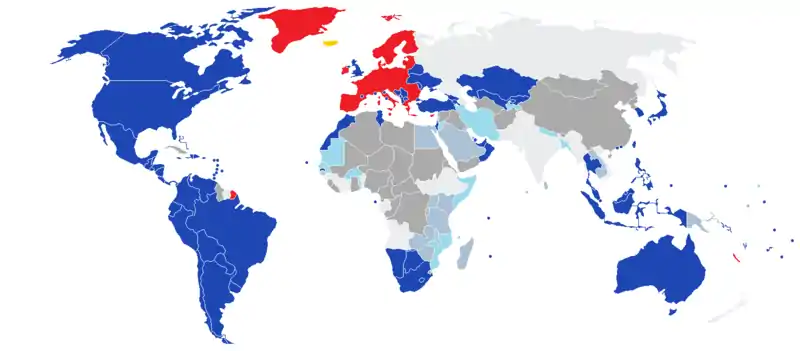Icelandic nationality law
Icelandic nationality law is based upon the principles of jus sanguinis. In other words, descent from an Icelandic parent is the primary method of acquiring Icelandic citizenship. Birth in Iceland to foreign parents does not in itself grant Icelandic citizenship.
| Icelandic Citizenship Act | |
|---|---|
 | |
| Parliament of Iceland | |
| |
| Enacted by | Government of Iceland |
| Status: Current legislation | |
Icelandic law changed on 1 July 2003 to remove restrictions on dual citizenship. Former Icelandic citizens who lost Icelandic citizenship before this date had until 1 July 2007 to reclaim Icelandic citizenship.
Descent from an Icelandic parent
A person acquires Icelandic citizenship at birth if:
- their mother is an Icelandic citizen;[1] or
- their father is an Icelandic citizen;[2] or
- their father or mother is a legal resident in Iceland and has previously held Icelandic citizenship[3]
Prior to 1 July 1982, acquisition of Icelandic citizenship from an Icelandic mother was restricted.[4] Those born to an Icelandic mother and a foreign father between 1 July 1964 and 30 June 1982 may be permitted to apply for Icelandic citizenship by declaration.
Naturalisation as an Icelandic citizen
A person may be naturalised as an Icelandic citizen after seven years' residence in Iceland. There are various concessions to the residence requirement:
- a reduction to four years for a citizen of another Nordic Council country
- where a person is married to (or in a recognised union with) an Icelandic citizen, the residence requirement is reduced to three years. The Icelandic spouse must have held citizenship for five years, and the marriage must have subsisted for four years.
- where a person is in a recognised cohabitation with an Icelandic citizen, the residence period is five years and subject to the same criteria as for spouses
- a reduction to two years for the child of an Icelandic citizen, provided the parent has held Icelandic citizenship for five years
- one year's residence is required for former Icelandic citizens
- the residence requirement for recognised refugees is 5 years
- a person born in Iceland and not holding any other citizenship may be granted citizenship after three years' residence.
Applicants are expected to be of good character and capable of supporting themselves in Iceland.[5]
Since 1 July 2003, applicants have not been required to renounce any foreign citizenship they may hold.
Declaration of Icelandic citizenship
In some circumstances, persons are able to become Icelandic citizens by declaration. This is a simpler process than naturalisation:
- a person resident in Iceland since age 11 (age 13 if stateless) who is aged between 18 and 20
- a former Icelandic citizen who acquired Icelandic citizenship at birth and was resident in Iceland until age 18, upon 2 years residence in Iceland
- a citizen of a Nordic Council state (other than by naturalisation) who has been resident in Iceland for 7 years
- a former Icelandic citizen who has, since the loss of their Icelandic citizenship, been a citizen of another Nordic Council state. The applicant must be resident in Iceland.
Persons not eligible for Icelandic citizenship by declaration may still be eligible for naturalisation.
Icelandic citizenship by adoption
A person adopted by Icelandic citizens normally acquires Icelandic citizenship on that basis if aged under 12. Where the adoption takes place outside Iceland, an application for citizenship is required.
Icelandic citizenship by law
Each year, a number of people petition Alþingi to acquire Icelandic citizenship by law. This is usually done if a person does not qualify for acquiring citizenship in any other way. One notable example of this process was the controversial chess champion Bobby Fischer.
Loss of Icelandic citizenship
Icelandic citizenship used to be lost through the acquisition of another citizenship, and it can in some circumstances be lost as a result of residence outside Iceland:
Acquisition of another citizenship
An Icelandic citizen who naturalised in another country before 1 July 2003 generally lost Icelandic citizenship automatically. The option to resume citizenship by declaration was available until 1 July 2007.
Residence overseas
An Icelandic citizen born outside Iceland is liable to lose Icelandic citizenship upon turning age 22 unless:
- he or she has taken up residence in Iceland before that time; or
- an application is made to retain Icelandic citizenship (renunciation of foreign citizenship is not required); or
- He or she has resided in a nordic country for at least 7 years.[6]
- with a total of seven years residence in Finland or another Nordic country
- with a total of seven years residence in Finland or another Nordic country
An Icelandic citizen who holds no other nationality cannot lose Icelandic citizenship on this basis.
Dual citizenship
With effect from 1 July 2003, there are no restrictions on Icelandic citizens holding dual citizenship. Prior to that date, dual citizenship was only permitted in limited circumstances (such as where another citizenship was acquired alongside Icelandic citizenship at birth).
Travel freedom of Icelandic citizens
Visa requirements for Icelandic citizens are administrative entry restrictions by the authorities of other states placed on citizens of Iceland. In 2020, Icelandic citizens had visa-free or visa-on-arrival access to 180 countries and territories, ranking the Icelandic passport 12th in the world according to the Visa Restrictions Index.
The Icelandic nationality is ranked 5th in The Quality of Nationality Index (QNI). This index differs from the Henley Passport Index, which focuses on external factors including travel freedom. The QNI considers in addition to travel freedom on internal factors such as peace & stability, economic strength, human development as well.
See also
References
- article 1 (1.gr.) https://www.althingi.is/lagas/nuna/1952100.html
- article 1 (1.gr.) https://www.althingi.is/lagas/nuna/1952100.html
- article 1 (1.gr.) https://www.althingi.is/lagas/nuna/1952100.html
- https://grapevine.is/news/2018/02/07/icelandic-man-doesnt-get-icelandic-citizenship/
- Ministry of Justice. "Icelandic Nationality Act, No. 100/1952". Government of Iceland. Retrieved 16 April 2020.
- "Icelandic Nationality Act, No. 100/1952". www.government.is. Retrieved 2021-01-13.

